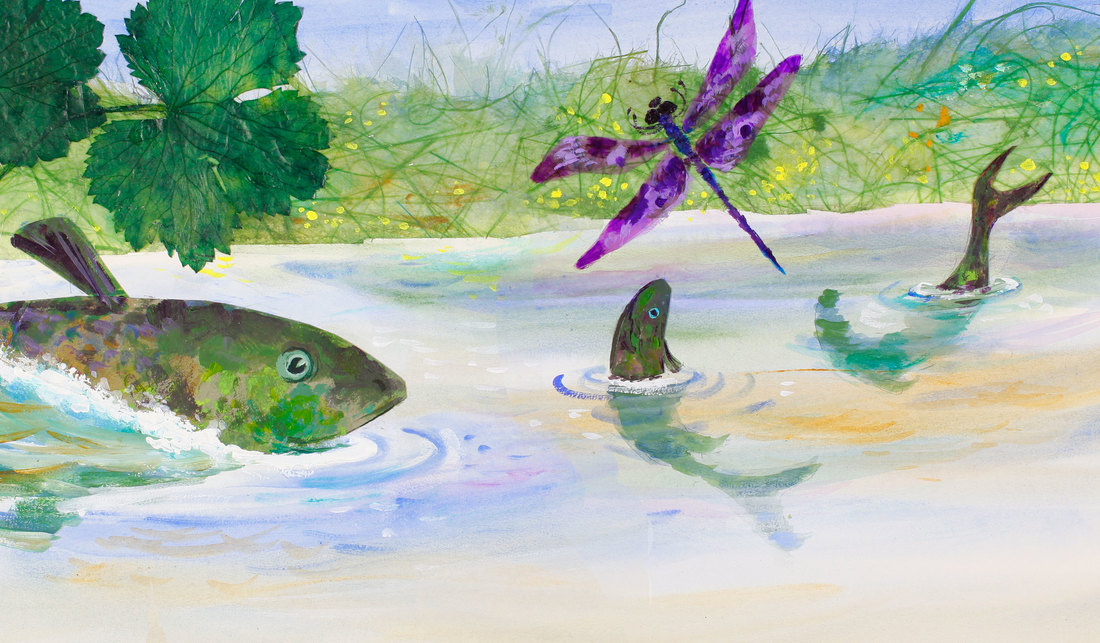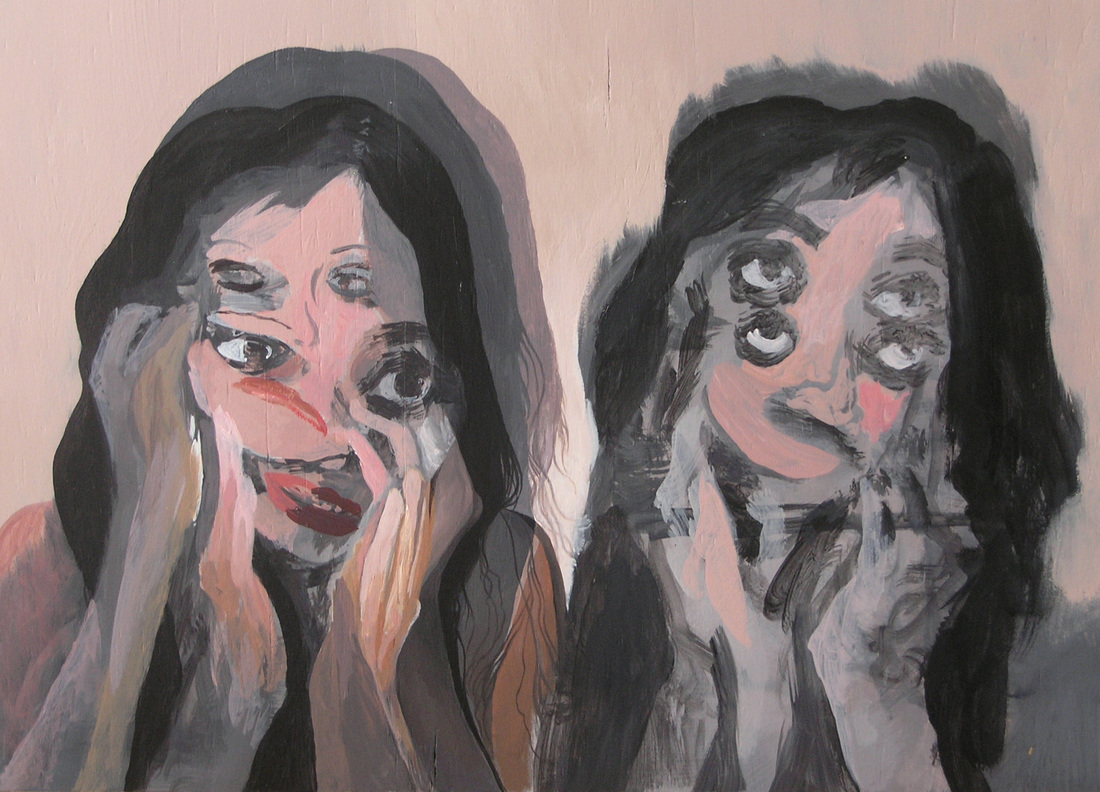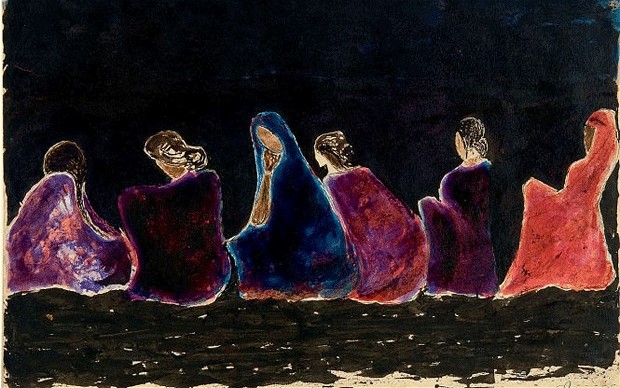|
My daughter loves reading right now. Mostly she’s obsessed with Curious George; but when I get the chance I read her a little book called Over in the Meadow. If you’re familiar with the dulcet sounds of Raffi in your family, the title of this book may sound familiar. It’s actually an old counting rhyme, listing out a series of meadow creatures from one to ten. I sing it rather than read it, which keeps V pretty entertained.
I’d heard Raffi singing “Over in the Meadow” many times, but honestly never listened to the lyrics other than briefly noting it generally had something to do with crickets and muskrats. So when hunting through the library shelves one day, I was intrigued to find an illustrated version. We brought it home, I cleared my throat (trying to remember exactly how the Raffi goes), and jumped in. Unfortunately we were only a few short pages in when the beauty of what I was reading/singing hit me. I started weeping, couldn’t keep singing, and needed a few minutes to collect myself while a surprised daughter looked on. Simply put, if you’re not familiar with Over in the Meadow (or maybe even if you are), it’s one of the best pictures of the creational norm, of the way life should be, that I’ve found. Each verse is quite simple. It starts by mentioning that over in the meadow some animal, or bird, or bug lives. Then it goes on to describe a mother of [insert animal, bird, or bug] instructing her offspring to do whatever it is said animal, bird, or bug does. The offspring respond enthusiastically, agreeing to do whatever it is they ought to do, and in conclusion they do it happily. Take for example the third verse about bluebirds: “Over in the meadow, in a hole in a tree, Lived a mother bluebird and her little birdies three. ‘Sing!’ said the mother. ‘We sing,’ said the three. So they sang and were glad, In the hole in the tree.” This simple ditty portrays the full glory of creation. In the creation, God said to each living thing, “Do this.” The world responded and God looked upon it declaring it good. The turtles dug, the fish swam, the muskrats dove, the bees buzzed, the ravens cawed, and so on and so on. And then each living creature turned to its offspring and repeated God’s command, teaching their young to joyfully do exactly as the Lord had given them to do. All that is, except for humankind, leading a simple little book like Over in the Meadow to remind me of the full tragedy of the fall. When I sing this book to my daughter, I feel a deep and longing ache. If the frogs know to croak and they know to tell their young to croak, and this is what they were made to do from beginning of the dawn and what they will find joy in doing until the end of all, what is the equivalent for me and my daughter? What is the one word summary I could give her to sum up the very meaning of our existence? That thing which she might do in response to my command which would give her the joy and satisfaction this song describes of life in the meadow finding the natural rhythms of their short lives? In the fall, humanity lost not only its memory of the life-defining command given to us by God, we also lost the joy inherent to that command. “Be fruitful. Have dominion.” This is a command we barely remember and when we do, it often feels bitter in our mouths. Unlike the bees who buzz in response to the millennia old command engrained in their genetic code, we are a lost and disjointed version of life, leading every human generation to ask again what our purpose here is. I want my daughter to grow up, knowing and feeling the pain of this loss. I want her to look at the animal world around her and to long for a simple obedience to God’s creational command. I want her to hear this song and one day ask me, “Mama, what should I do?” My favorite verse is the last one. The tenth verse is about fireflies: “Over the meadow, in a soft shady glen, Lived a mother firefly and her little flies ten. ‘Shine!’ said the mother. ‘We shine,” said the ten. So they shone like stars, In the soft shady glen.” When I sing this verse, it takes my mind to words far more ancient that Over in the Meadow. “Therefore, my beloved, as you have always obeyed, so now, not only as in my presence but much more in my absence, work out your own salvation with fear and trembling, for it is God who works in you, both to will and to work for his good pleasure. Do all things without grumbling or questioning, that you may be blameless and innocent, children of God without blemish in the midst of this crooked and twisted generation, among whom you shine as lights in the world, holding fast to the word of life, so that in the day of Christ I may be proud that I did not run in vain or labor in vain. Even if I am to be poured out as a drink offering upon the sacrificial offering of your faith, I am glad and rejoice with you all. Likewise you also should be glad and rejoice with me.” Philippians 2:12-18 Obviously, this mouthful is a lot more wordy than can fit into an eleventh verse of Over in the Meadow. Nonetheless, it’s a solid reminder of the directive that still remains for us fallen and lost children. Obey. For it is God who works in you. Do not complain. Rather shine in this world. Hold on to the word of life. Rejoice and be glad. These are things I can tell my daughter if she ever asks what she, like the animals, birds, and bugs, ought to do. ~ Hannah *I’m guessing there are more than one illustrated version of Over in the Meadow, but I personally recommend the version by Ezra Jack Keats. You may know him as the author and illustrator of The Snowy Day (another personal favorite). His illustrations of this old folk song will not disappoint.
1 Comment
I love hearing testimonies of the saints and often find myself wishing they were a more regular part of corporate worship in churches. Recently I was pretty excited when City Reformed in Pittsburgh asked me to share how God has worked in my life. Hearing people’s stories is always a great encouragement to me, so it was touching to (hopefully) encourage others with my own. I ended up being pretty nervous - it's not easy to be vulnerable about personal experiences in front of a church. But the chance it gave me to really reflect on God’s work in my life, having to process and articulate it, was invaluable. I’ve been doing a lot of that this past year – processing God’s work in my life – so I’ve decided to share some of my processing here on the blog. I’ll start today with the testimony I shared in church.
It might be obvious, but trying to sum up a lifetime of God’s work in my heart is really difficult. As I’ve thought about it over the past few days, though, I think it comes down to two significant things. First, my will. And second, my identity. I’ve always been a very strong willed person, and while this can really be a great asset in life, it also means that I can often find myself in conflict with others. A lot of my memories from growing up involve fights and debates, not only with my parents, but also with my siblings and friends. Simply put, I don’t naturally like having to submit to a will that I disagree with. I never really connected this aspect of myself with my spiritual life until I was eighteen, though. I grew up in a believing home and thankfully I had a lot of wise people around me with whom I could discuss my more intellectual questions about the gospel. By the time I finished high school, I remember that most of my big questions about the meaning and reliability of the gospel message had been answered. So instead of struggling with doubt, I came to a point of struggling with the call to submit to Christ. I distinctly remember lying in my bed one night not too long after turning eighteen and realizing that I had no doubt about the truth of scripture and the truth of the gospel, but for the first time admitting to myself that I hated God. I simply just didn’t like the idea of needing to submit my life and my will to something above me. But admitting this to myself really terrified me. Because I didn’t doubt the reality of God or the truth of scripture, I knew that willfully rejecting God was an honest choice of damnation, and I didn’t really want to be damned. After arriving at this conundrum that night, I spent one of the longest and most “emo” weeks of my life basically just sitting around on empty park benches trying to puzzle out this battle between my will and what I knew to be true. But if you ever find yourself going through a midnight of the soul like I did, don’t expect any sudden revelations or blinding light moments. It took me a long, slow year of processing to ultimately work through this conflict. But by the end of that first week, I had arrived at a few conclusions at least. Most importantly, I realized that because God’s will is bigger than mine, he would have to choose to let go of me in order for me to really escape him; but, from what I knew from scripture, it didn’t seem like he would do that. I had a vision that God’s will kept me in his hands. I could shake my fist at him and I was free to express my anger, but I could not just loose myself of his grasp unless he desired to let me do so. My will was beat. I could now start the process of learning about and learning to love the God whose will would always be stronger than my own, and I consider that time my real spiritual rebirth. The second main work God has done in my life involves my sense of identity. Beginning in my childhood, I have moved nine times across three continents. This may sound exciting, but I have always desired a sense of belonging and home. I think for some people, so much transition is pretty easy; but, for me it has brought about a lot of deep rooted struggles that are often expressed in the dual needs to belong and to prove myself. These two issues came to a head, though, when I moved to China in my mid twenties to work for a campus ministry and within six months of arriving, I found myself so sick that I couldn't get out of bed for about half of every month. I eventually discovered that I was suffering from asthma, but all I knew for many months was that I had gone from being a successful student and worker in the US to what pretty much felt like failing as a missionary. To make matters worse, I was in a strange country and struggling to build community. My sense of identity was challenged to the core as both my feelings of belonging and my ability to prove myself were taken away from me. But amazingly, that time was the closest I have ever been to the Lord. Having all of my supports taken away from me forced me to fully lean on Christ for my sense of self. All of the worldly things that usually shape my identity were gone, but I didn’t lose myself because I discovered that as a child of God, my identity is ultimately in him. I could lose everything while far from home and still be ok because I was at home in my identity in Christ. I tend over analyze most things, but these two ways that God has worked in my life are not simply in my head. They have had serious practical results, namely, that I am a less contentious and less fearful person. That doesn’t mean I do not still struggle with these things, but when I look back to my earlier life, I can see a difference. Learning that there is a will larger and stronger than mine has given me a freedom to repent of my sins and to trust in the provision of God. Learning that my identity is completely in Christ has started to free me of my need to prove myself and of my fear of what people think about me. Since getting married and moving to Boston, I’ve continued to learn and grow a lot. I’m learning about the holy fear that comes when God answers a prayer you were taught to pray from the time you started speaking. I’m learning that marriage demands more of me and gives more to me than I could ever have imagined. I’m learning that loving the church requires a painful level of humility and a supernatural level of grace. And I’m learning what it means to work hard for something you want and believe in without making it an idol. Ultimately, I’ve been learning about the amazing and sweet abundance of the Lord – that his blessings are unpredictable and incredible, and that he gives far more than I deserve. And while all of these more recent lessons are good and have been so important, I still find myself needing to learn about finding my identity and home in Christ, surrendering my will to his. These are lessons I expect will continue with me all of my days. As I anticipate how God might keep working in my life along these lines, I find myself contemplating how he wants me to learn to rest in him, letting both of these lessons lead me to greater peace. Our God is a good God, and I hope this testimony of my own relationship with him encourages you in your own. ~Hannah Some weeks ago I came across something on Facebook that deeply saddened me. I realized that a friend's life is rapidly moving in a certain monumental direction, and while her announcement received the praise of hundreds of friends, this decision is something I'm pretty sure will be destructive. In the end only time will tell, but when I saw the announcement, I felt a lot of guilt. I've been out of touch with this woman for more than a year and we were never close to begin with. But there were times when she tried to bring me into her inner circle, and then there were times when I tried to befriend her. But the connections never really happened. It grieves me knowing that even if I started pursuing her now, by the time we could even start approaching the topic at hand in a context of trust, some things would be too late. It would be a very different conversation - how to deal with the results of the decision, rather than whether to go through with the decision.
I've worked in student ministry for the past eight years and I've faced these situations over and over again; but these things aren't relegated just to those who serve professionally. Everyone understands this dilemma - the guilt we inevitably face in attempting to love and serve others. Call it "ministry" or call it "loving your neighbor" or call it just plain old "friendship," but in my experience, the very act of engaging another person in the hopes of being Christ to her all so often leaves behind a hundred doubts. In the attempts at loving another person, how many times have you left thinking, "I should have done that differently," or "If I only I had noticed that." Often, it simply feels like a long series of wake-ups to other people's realities only a few moments, or days, or years too late. After all of this news broke, I went for a walk with one of my dearest friends and I shared the situation with her. Because she loves people, she also understands this struggle and shared with me some of her own stories about regrets she has for not being there for certain people. We both have so many stories of times and situations that seemed to make sense, but in hind sight, as someone's life is falling apart, we look back and think about all we could have done to help them. Like me, "guilt" was the word she used over and over again to describe how it feels. For a moment, let's be honest - more than fear or selfishness, I think it is guilt that actually keeps us from loving people as we should. Not guilt in the cosmic sense preachers and psychologists refer to, but specific guilt about specific people that we know we have failed in our attempts to love. It doesn't take long in trying to love people before you realize that you are your biggest obstacle in doing so. In my attempts to be Christ to others, I have a body count. A long list of women that I tried to serve and whom I have utterly failed. Some of those relationships were from my work with students, some of those are just my personal friendships. Some of them are my family members. In some of the cases the circumstances were so murky and confusing that I am not really sure what happened. In some cases it is blatantly clear that I sinned against a sister. Or that she sinned against me and I simply couldn't handle it. And it is all of these cases, all of these people, that tempt me to disregard my fellow human beings moving forward. I mean, who doesn't think that they want to help and love people? Most people are taught some general idea of the rightness of that desire from an early age. But how in the world are you supposed to continue wanting to do so when it becomes abundantly clear that you often have just as much a chance at becoming their greatest stumbling block as their greatest blessing? Loving people produces guilt. When we have all tried it and seen ourselves fail, we are left with a vortex of doubt and shame. In myself, I know that I generally trend in one or the other of two directions when that vortex arrives. I either become defensive - it was the other person's fault; no one could have known; the system is to blame. Or I cease to care - there isn't really a problem anyways; no one person can shoulder that many burdens; I need to take care of myself, too, you know. But all of these excuses are just covering up the real problem - I feel terrible that someone I know is suffering either from their own sin or from the brokenness of the world and I didn't do anything, or enough, about it. For the last couple of years, I dealt with a good bit of burnout in ministry. Some of that was due to being too busy and the time of life. But a lot of it - in hindsight, probably most of it - was due to a really painful relationship. I failed a student miserably about three months before she moved away from Boston. Without a doubt, there was a lot that was her fault. But as equally without a doubt, I let so much pride and stubbornness rule my actions that my face burns with shame thinking about it. She wouldn't talk to me for three months because she was so mad at me and during that time I sank deeper and deeper into self-pity. I gave up on the possibility of me being able to be a blessing. I could list off all sorts of reasons why sometimes things just don't work out, but really, I was just seething with the guilt of a lost opportunity. During that time, and in the years since, I came to realize more than ever that repentance must be a daily occurrence in the life of anyone trying to love another person. No matter what kind of advice or training is out there for people hoping to serve other people, there is nothing that will keep you going in ministry, whether professional or personal, other than repentance. Unless your heart is being drawn into open confession before the Lord, no amount of devotions, or fellowship, or team building, or strategy development, etc. can take the place of simple and consistent repentance for your failures before God. Otherwise, you'll either go crazy trying to defend yourself or you'll go dead with apathy. We cannot live with guilt - it chokes and kills any impulse within us to love others. This is what you often don't hear from people ministering to others - from pastors and parents, from social workers and student leaders - that the people we are the most afraid of are ourselves. We try to talk about all of the ways God is at work transforming lives, but we rarely talk about how God is transforming our own lives. We don't openly talk about the times those we serve are so failed by us that they don't speak to us for three months. But the gospel is real. And it is the only, only thing that can accomplish true ministry. The reason I can love people is not because I am that strong, but because I know that my love doesn't matter in the end. There is a bigger love and a bigger story for all of these people. For whatever crazy reason, God chooses to use small, unloving, broken people to demonstrate that. Maybe it's the only way to demonstrate it. We often talk about Christians demonstrating God's love and we usually mean doing so positively. But maybe the times we fail also demonstrate the love of God by demonstrating his patience and kindness to those he calls his own. In the end, loving people is only ever going to reveal more of my own brokenness to myself. If that's the case, then I am going to need to learn to repent more. The good news is that through Jesus, that is possible. In him, I am free to repent and without fear. I can look at my friend on Facebook, name the ways I failed her, and freely repent of them. I do not have to hide, I do not have to live in guilt. Only then will I have the courage to love again. ~ Hannah (Artwork: "Two Part," by Patrick Fisher) Last night I sat on my husband's lap and cried into his shoulder. I wasn't really sure why I was crying. In some ways it felt like I was crying over nothing. In other ways it felt like I cried because of everything. I wasn't so upset that I couldn't talk. It was one of those strange moments when tears are coming out of your eyes and snot is welling up in your noes, but you look significantly worse than you feel. All of my thoughts were still with me, and unlike the many other occasions when crying makes them murkier and more confusing, last night's cry put everything into focus.
It's been a weird week. It's been hard to even know why it's been weird. I've been stressed to the max with a Master's thesis I'm trying to write. Each day I've sat down and seriously doubted everything - my topic, my timeline, my brain. Which of course has led me to doubt so many other things about myself - life choices, financial situation, calling. And when I doubt those things, I tend to go on crazy power grabbing hunts. I set my eyes on the best schools I could possibly get into. I make crazy goals for myself like working five career advancing jobs and working out every day and publishing and eating only healthy food and loving everyone I meet and serving in every way possible in my church and getting pregnant right now and cooking more often and... and... and... I recently read an article someone posted on Facebook about how women can't have it all and how we shouldn't be trying to have it all. Last night, what brought me to tears was realizing why I struggle with wanting it all. The question isn't whether I can or should try for it all, but rather, why do I even want it all in the first place? The truth is, more than anything else in life, I want glory. It's like lead poisoning in my soul. It's so much a part of my nature and a part of my environment that I don't even know it's there until I face these weeks when the sheer stress of it all makes the poisoning obvious. I have struggled with this disease my entire life. In fact, I would even go so far as saying that a lust for glory is the single more basic thing for understanding who I am and the decisions I've made. It's been intangible enough that it isn't immediately obvious when looking at my life. But when I think of my youngest self and the way I wanted, truly thirsted after being a princess, movie star, or celebrity more than anything else, I see this desire for glory. Then I grew up a little and my pre-teen interests developed and I fell in love with ice skating and dreams of going to the Olympics, and still it was there. Of course those dreams didn't last, but by then I was a teenager and the definition of glory simply changed. The glory I sought after didn't have to be world-renowned. No, I was pretty content with seeking after the more localized glory of "coolness." I wanted to be cooler than everyone else, alone in my glory among the throngs of the "uncool" world. By college, this desire hadn't quite dissipated, but a different sense of glory was growing in competition. Romance. I wanted to find the one person who would bring me the more adult glory of marriage and sex. That was a long quest, and eventually it choked out the glory of being cool. It's amazing, though, how quickly everything changed once I got married. Almost immediately, my heart made the subtle shift from relational glory to the glory of a career. With one major thing checked off, the glory quest moved on to the next thing. Sometimes I am just so damn tired of it. I have repented and repented and repented again of this thing inside me, but most often it seems like there is just so little to do about it. It is so far, deep, down in my soul that unless I am actively staring it in the face, it will resurrect. It will come back again, and then again in one form or another. It's not the whack-a-mole of sin. At least with whack-a-mole, the mole always looks the same and there are a limited number of spots where it can appear. It's more like the shape-shifting living dead - I can never tell it's there until it's eating me alive because it never looks the same. As I've been struggling through all of this over the past week, a few images have been floating through my head. First, the funerary words, "She hath done what she could," spoken in memory and honor of a dead 19th century missionary wife. (If you want to know where in the world I got that from, ask my thesis.) Second, the image of Furiosa from Mad Max. These are two very incongruous images - there probably isn't anything more oddly juxtaposed than a meek and petticoated woman from two hundred years ago and a feminist icon who rips the bad guys' heads off. But they are deeply linked in my mind. I just watched Mad Max: Fury Road for the first time last weekend. I had wanted to see it when it came out and I read all of the countless reviews raving about Furiosa. But I don't think I could have understood just how striking she is as a character until seeing the movie for myself. She is, hands down, my favorite portrayal of a heroine I have encountered to date. My favorite used to be Tolkien's Eowyn, but Furiosa cast a light on Eowyn I had never noticed before. I haven't read the books and or watched the movies for quite a long time, so my memory may be faulty, but I remember it being pretty clear that Eowyn wants the glory of battle. She is not allowed to go and so there is a lot of discussion about her desire to participate in something so honorable. She wants to protect her home and family, yes, but she honestly also just wants to be part of something so downright great. Eowyn wants glory. Furiosa, on the other hand, is not once portrayed as considering glory, or even herself, in her quest. She has a mission and she will do whatever it takes to complete it. Whereas Eowyn's desire for a glorious quest requires her to be secretive and cut off from the others, Furiosa's mission requires her to know both her strength and her weakness, enabling her to ask for help when and where she needs it. At the end of Eowyn's battle, she has done something remarkable and she has done something good, but there is much about her narrative that is clearly focused on Eowyn and her triumph as a victory for herself. At the end of Furiosa's tale, however, the clear narrative is that "She hath done what she could." I think for my entire life, I have wanted to be Eowyn. I have never been able to look beyond the glory involved in the good things there are to do. I have never been able to truly escape myself in the various quests I've set out upon. But glory is not mine to seek. Glory is something that belongs to God alone. As my sweet husband reminded me last night while my snot and mascara smeared across his sweater, one day, because I am his heir and child, God will glorify me at the end of time as he promised. "For you did not receive the spirit of slavery to fall back into fear, but you have received the Spirit of adoption as sons, by whom we cry, 'Abba! Father!' The Spirit himself bears witness with our spirit that we are children of God, and if children, then heirs - heirs of God and fellow heirs with Christ, provided we suffer with him in order that we may also be glorified with him." But let's be honest, I don't even really know what that means - to be glorified with God one day. So while I may live in the hope of glory, I really can't seek it now, in this life. In the end, I'm not even really sure what I'm trying to process in this post other than that I need Jesus. And I need whatever the anti-lead-poisoning equivalent for the soul is. Which is probably just more of Jesus. I'm really not a fan of the "just open to a certain page and find God's message for you" approach to life, but sometimes it is shocking how well it works. Most nights, I tend to just lie in bed gooning out on my phone while Trey brushes his teeth. But last night, for some inexplicable reason, I put the phone down and picked up Augustine's Confessions. I have it in my stack of books next to my bed as a hopeful "one day I won't look at my phone and will read this instead" reminder. I opened to wherever I had last left off and found the following words. "You have rescued me from all the evil roads I have trodden, and given me a sweetness surpassing all the pleasant by-paths I used to pursue. Let me have a mighty love for you; in my inmost being let me hold tight to your hand, so that you may deliver me from every temptation to the very end." (1.15.24) All of the paths of glory are my lustful temptations, but God has rescued me from them. The cure for my glory-sickened, leaden heart is the same one Augustine sought - to hold tight, very tight, in my inmost being to the hand of God. ~Hannah 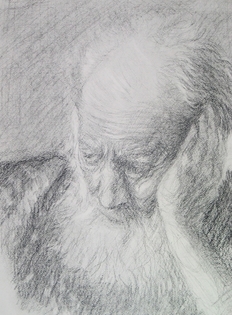 Abraham heeded the Lord’s calling and his willingness to do so is credited to him as righteousness; this despite his tragic rebellions along the way. Sometimes, Abraham obeys quickly and willingly and at other times he fails hard. Throughout it all, though, God continues to call and Abraham continues to respond. He lives his life following the Lord, even when it is not clear why or for what purpose. I sometimes find myself identifying with Abraham because I think he must have been exhausted at times. Like Abraham, I often feel like I don't understand what God is doing in my life. I want to see the big picture so badly, but God rarely seems to share that particular concern. I wonder how Abraham could have responded so quickly to God’s call to leave all that he knew behind. God required him to leave everything familiar and become a sojourner, thereby losing his very identity. As I read his story, I feel the frustration and confusion of following the Lord when the promises seem so real, but the immediate reality so unclear. Hebrews 11:8-16 tells us: “By faith Abraham obeyed when he was called to go out to a place that he was to receive as an inheritance. And he went out, not knowing where he was going. By faith he went to live in the land of promise, as in a foreign land… For he was looking forward to the city that has foundations, whose designer and builder is God… Therefore from one man, and him as good as dead, were born descendants as many as the stars of heaven and as many as the innumerable grains of sand by the seashore. These all died in faith, not having received the things promised, but having seen them and greeted them from afar, and having acknowledged that they were strangers and exiles on the earth. For people who speak thus make it clear that they are seeking a homeland. If they had been thinking about that land from which they had gone out, they would have had opportunity to return. But as it is, they desire a better country, that is, a heavenly one. Therefore God is not ashamed to be called their God, for he has prepared for them a city.” The writer of Hebrews helps us understand why Abraham could quickly give up what he already had to follow the Lord’s call. For Abraham, the promises of God were more real than everything he had already attained. How could he not follow? There is a lot of uncertainty in my life. I've worked in ministry and lived off of support raising for most of my adult life. I have moved ten times across multiple cities, regions, countries, and continents. I want to return to school uncertain of how to fund it. I am a woman in what is still very much a man’s world. I want to have children and I want them to love the Lord. Each and every one of these things brings great uncertainty into my life. I often find myself trying to grasp ahold of these things to make certain of them; but the more I try to do so, the more dissatisfied and anxious my heart becomes. The more I try to force God’s promises, the more I find the results to be my personal Ishmaels. What brings me peace, joy, and rest is believing that the promises of God are more real to me now, even in all of their hazy unclarity, than what I can produce myself. The city with sure foundations already belongs to me through the blood of Christ and when I keep my eyes focused on it, all of the sojourning through this world quickly passes by. In an act of historical imagining, I think the words of Augustine could have brought great comfort to Abraham. At least, they have brought much comfort to me in my own attempts to obey God’s calling, focusing my eyes on the sure foundation and heavenly city throughout my wanderings. Augustine writes in his Confessions 1.5.5, “Who shall give me the gift of resting in you? Who will grant me this, that you come into my heart and make it drunk, so that I forget my evil deeds (Jer. 44.9) and embrace you, my only Good? What are you to me? Have mercy on me, and let me speak. What, for that matter, am I to you? Why do you command me to love you? And if I do not, why are you moved to anger and threaten me with utter misery? But is my misery any less, if I fail to love you? Have pity, O Lord! For your own mercies’ sake, O Lord my God, tell me what you are to me! Tell my soul: I am your salvation (Ps. 35.3[Ps. 34.3]). Speak, and let me hear your voice. Bend down to my soul’s ear, O Lord; open it, and tell my soul: I am your salvation. I shall run after your voice, and catch you (Phil 3.12). Do not hide your face from me. Let me die to see it; for if I do not see it, I shall die.” It is still amazing to me that Abraham so quickly heeded the Lord’s call and remained faithful to it throughout his life despite so many doubts and disasters along the way. But I think he would have understood well the heart of Augustine’s words above. Following God often feels like a crazy leap into uncertainty, yet we know it is the most certain thing we do. Abraham’s life demonstrates to me that in the pursuit of God’s face, I must “die to see it; for if I do not see it, I shall die.” ~Hannah "Until all Christian women have learned that the cross of Christ is not to be sung about nor wept over, nor smothered in flowers, but set up in the midst of our pleasures; that our Lord never commanded us to cling to the cross, but to carry it, the work of the missionary circle will not be done, nor its warfare accomplished."
-Helen Barrett Montgomery Last night Trey lay on our living room floor groaning as he suffered from stomach problems that will here remain undisclosed. In due time his problems passed and as soon as speech was restored to my sad husband, he commenced making a series of jokes about the event. Most of his jokes were about bloating and how miserable it must be as a woman to deal with such occurrences on a regular basis. Of course, I agreed. From there we somehow ended up on the topic of menopause and whether it is a relief for women or not. Of course, I have no experience and very little knowledge regarding this life event, but I told him that I didn't think women ever felt much relief from their bodies, even post-menopause.
The female body has been on my mind a lot in the last twenty-four hours. I've been reading a really interesting book on the social and intellectual history of American women in missions and yesterday I read the story of a sixty year old missionary who was forcibly circumcised and then murdered in her home almost one-hundred years ago in protest to the missionary community's stance against Female Genital Mutilation (FGM). FGM is something I had heard of before, but didn't know much about, so I spent a good hour researching it online. By the end of that hour I was pretty sick to my stomach. Even though it is illegal in most countries today, FGM is still widely practiced. It seems change has been slow over the last one-hundred years. I've also been reflecting on the physical suffering of many women near and dear to me. Many of those close to me have suffered from a variety of illness all related to the female organs. From cysts to cancer, I've seen many friends face the realization that these things which belong to us women in order to give and create life in fact bear the marks of death. Wombs which are designed to grow living things and breasts that are intended to nourish and feed somehow become woman's greatest liability, things which doctors and celebrities tell us we should be unafraid to hack off or away, but which every woman I know touched by such scars grieves immeasurably over. And then I've been thinking a lot about the most fundamental of woman's sorrows - the angst and pain of childbirth. The longing and fear associated with everything from conception to birth is so complicated, but so basic to every woman. No matter how advanced our society becomes, this basic issue remains at large. How can I control what my body was created to do? How can I live a life that isn't in tension with what my body will naturally do? How can I produce results when my body won't do what I thought it was supposed to do easily? Pregnancy (whether wanting it or avoiding it) has always been and will always be a battleground for women and I understand this more and more and as I hear my friends' stories about pregnancy, birth, nursing, infertility, and miscarriage. My conclusion last night while joking around with Trey was that every woman is looking for heaven for, in, or through their bodies. We are waiting for, longing for, peace with our female physical existence and all women, throughout the ages, have desired such redemption. As twisted as they are, we see the striving for heaven in FGM practices - women themselves are at the heart of female circumcision and it seems that fundamental to the practice is the desire to maintain purity. Women who practice FGM see their cultural definition of purity as necessary to their existence and happiness - their attempt to attain the ultimate good in their temporal reality. And in order to attain this purity they want so desperately, women willingly perpetuate a cycle of physical mutilation. We see the longing for heaven in the Western world's glorification of birth control and family planning. Unlike our sisters in Africa, purity is not our greatest desire, but rather freedom from our physical reality. We are looking for redemption from our bodies and have created complicated systems to liberate ourselves from their natural functions. We believe that our heaven lies in Western medicine and its ability to control what for millennia has felt completely out of control. In the most brutal and bloody ways, we see the longing for heaven in the diseases and mortality rates suffered by women. In the developed world, we witness women faced with decisions of cutting off their breasts and cutting out their wombs in order to survive. In the developing world, we watch as early marriage and childbirth itself both threatens and delivers women. Threatens because childbirth itself wrecks a woman's body and particularly so when the woman is really only a young girl and medical assistance is nonexistent. Delivers because early marriage saves the girl from certain shame at the hands of men and ostracism at the hands of women. For women suffering in hospitals around the world, their bodies are a constant reminder of the longing for deliverance. The woman's body is a place of suffering and it produces a universal longing in women for things to be made right. The ways in which women seek for things to be made right might change over time and cultures, but from the first menstrual cramps to the last battle to save one's breasts, women are constantly reminded that all is not well in this world. We know things must be set right because we know that things must be set right in us. We take extreme measures to find heaven for our female bodies through FGM practices or abortion or preventative double-mastectomies because we are desperate to make all well as we face the physical reminder our own bodies give us that the world is broken. The problem is that we most often seem incapable of knowing what heaven to be long for and it leads us to dark and twisted places. Women are earthy. Our physicality makes us so as we bleed and lactate and cry. Religions and philosophy and medical practices over the vast array of civilization have demonstrated the degree to which woman's body is associated with the earth. And along with the creation, our female bodies groan for redemption. "For the creation waits with eager longing for the revealing of the songs of God. For the creation was subjected to futility, not willingly, but because of him who subjected it, in hope that the creation itself will be set free from its bondage to corruption and obtain the freedom of the glory of the children of God. For we know that the whole creation has been groaning together in the pains of childbirth until now. And not only the creation, but we ourselves, who have the firstfruits of the Spirit, groan inwardly as we wait eagerly for adoption as sons, the redemption of our bodies." I don't know what our physical existence will be like in the new heavens and new earth. I don't think scripture reveals much about it to us. But I do know this - the longings and groanings regarding the realities of my and my sisters' bodies will be redeemed. It may include all of my reproductive organs or it may not, but I know that my female body will find heaven at last. ~Hannah These two articles are spot on and they are excellent food for thought. I've found them deeply challenging and hope you do two. We simply have to rethink what it means to be the church. Period. 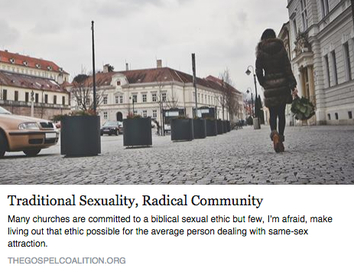 Click to read full article Click to read full article "Do you realize what you’re asking of me? I did. I was asking him not to act on his same-sex desires, to commit to a celibate lifestyle, and to turn away from an important romantic relationship. Yet as I reflect on that discussion, I now realize I didn’t fully understand what I was asking of him. I was asking him to do something our church community wasn’t prepared to support. I was asking him to make some astonishing and countercultural decisions that would put him out of step with those around him. In many ways, I was asking him to live as a misfit in a community that couldn’t yet provide the social support to make such a decision tenable, much less desirable. No wonder he walked away... The sexual demands of discipleship will become more plausible and practical to our gay (and straight) single friends if they see everyone in the community taking seriously all the demands of the gospel, not just the sexual ones." 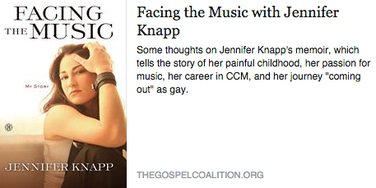 Click to read full article Click to read full article "Today, whenever I listen to “Whole Again” or “Undo Me” or the spine-tingling “Martyrs and Thieves,” I’m sad. Sad because of the painful choices Jennifer’s parents made in the name of “self-discovery” and “self-expression” that led to harmful repercussions in the lives of their children. Sad because evangelicalism’s lack of ecclesiology and reliance on experience has led to so many strange and harmful expressions of faith. Sad because even though Jennifer had the integrity to be honest about her life rather than continue to make money under false pretenses, she received ridicule and insults from Christians she once wrote for. Sad because of the way faith gets privatized to the point that the exclusive Savior’s inclusive call to repentance seems too narrow a road to freedom. Sad because evangelicals are so quick to catapult converts into the limelight before they’ve had time to grow in wisdom and truth. Sad because of the pain many of our gay and lesbian neighbors have endured within a church culture that calls sinners to repentance but not the self-righteous. Sad because, apart from affirming her sexuality, I can’t see any way that Jennifer would think someone could love her. Sad because many Christians find it easier to love positions rather than people, while others believe it is impossible to love people without adopting their position." ~Hannah Hey everyone! Check out this new project I'm helping with - www.chinapartnership.org/blog. We're starting up a new blog on China and its church as well as global-local ministry in the US. Still working out a lot of kinks with with site, but I think it's going to develop into something really good in the coming months. We'll be fully launching in January! ~Hannah Click the picture to read my introduction to the blog!
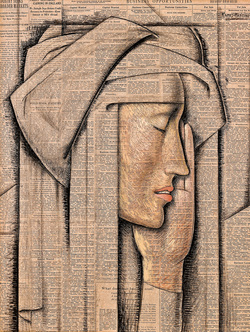 The author of the following and I come very different perspectives and I would be remiss to recommend much of her other work, but her thoughts here are beautiful and thought-provoking. So I thought I would share... "Our theme is the world of life, the word communicated through... a word written in blood. In his blood shed for us Jesus signs the new testament assuring us of God's forgiveness and bringing us into a new relationship with one another... The litmus test of our love for God is our love for others, our love expressed not only in the giving of our lives but in the sharing of our goods, our livelihood, with the poor of the world. And for some that has meant literally laying down their lives. For since we last met we have seen the body of Christ shedding its own blood through the witness of the martyrs... who died with clothes stained with the blood of sacrifice, blood freely given for the poor and oppressed in the struggle for justice and in the ministry of reconciliation. The shedding of blood can be a symbol of creation and life rather than destruction and death. For a woman the shedding of blood which is sometimes thought of as a curse is in fact a blessing. It is a sign that her body is being prepared to give birth if and when life is conceived within her. And even if she personally never knows the privilege of motherhood, the instincts and energies released within her can be used by God in the partnership of sustaining and nourishing his children, deprived or robbed of their full human dignity. She is called to magnify life wherever it is diminished, as, like Mary, the mother of Jesus, she magnifies the Lord. Jesus compared his disciples to a pregnant woman. While the world waits hopefully she must agonize and labour to bring to birth the life hidden within her. We live in a world pregnant with his coming kingdom. We share the travail and the labour and the sweat of bringing to birth that new age of the son of God, to whom, as the writer of the epistles puts it, the spirit, the water and the blood bear witness." - Dr. Pauline Webb based on 1 John 1:1-4, "That which was from the beginning, which we have heard, which we have seen with our eyes,which we have looked at and our hands have touched—this we proclaim concerning the Word of life. The life appeared; we have seen it and testify to it, and we proclaim to you the eternal life, which was with the Father and has appeared to us. We proclaim to you what we have seen and heard, so that you also may have fellowship with us. And our fellowship is with the Father and with his Son, Jesus Christ. We write this to make our joy complete." Also echoing Galatians 4:19-20, "My dear children, for whom I am again in the pains of childbirth until Christ is formed in you, how I wish I could be with you now and change my tone, because I am perplexed about you!" and Matthew 24:4-8, "Jesus answered: 'Watch out that no one deceives you. For many will come in my name, claiming, ‘I am the Messiah,’ and will deceive many. You will hear of wars and rumors of wars, but see to it that you are not alarmed. Such things must happen, but the end is still to come. Nation will rise against nation, and kingdom against kingdom. There will be famines and earthquakes in various places. All these are the beginning of birth pains." |
Archives
October 2018
Categories
All
|
